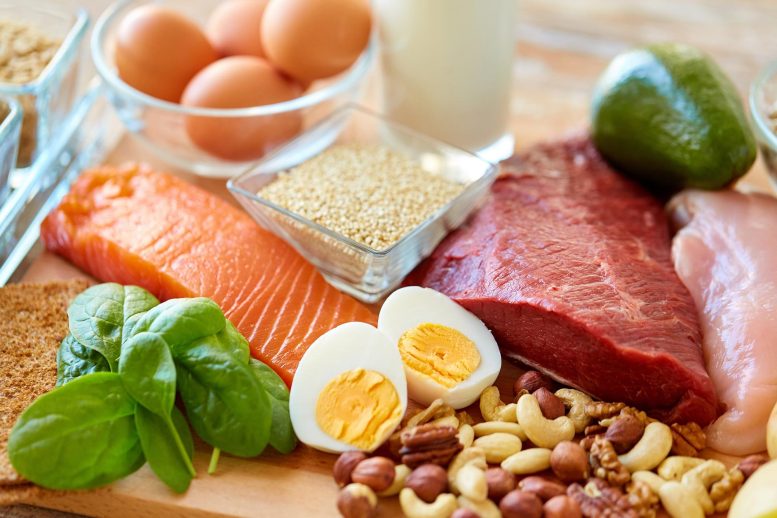
High protein consumption may elevate atherosclerosis risk by activating immune cells that contribute to arterial plaque formation, with leucine playing a critical role, according to a study by the University of Pittsburgh School of Medicine.
High protein consumption may elevate atherosclerosis risk by activating immune cells that contribute to arterial plaque formation, with leucine playing a critical role.
University of Pittsburgh School of Medicine researchers discovered a molecular mechanism by which excessive dietary protein could increase atherosclerosis risk. The findings were published on February 19 in Nature Metabolism.
The study, which combined small human trials with experiments in mice and cells in a Petri dish, showed that consuming over 22% of dietary calories from protein can lead to increased activation of immune cells that play a role in atherosclerotic plaque formation, driving the disease risk. Furthermore, the scientists showed that one amino acid – leucine – seems to have a disproportionate role in driving the pathological pathways linked to atherosclerosis, or stiff, hardened arteries.
The Risks of High-Protein Diets
“Our study shows that dialing up your protein intake in pursuit of better metabolic health is not a panacea. You could be doing real damage to your arteries,” said senior and co-corresponding author Babak Razani, M.D., Ph.D., professor of cardiology at Pitt. “Our hope is that this research starts a conversation about ways of modifying diets in a precise manner that can influence body function at a molecular level and dampen disease risks.”
According to a survey of the average American diet over the last decade, Americans generally consume a lot of protein, mostly from animal sources. Further, nearly a quarter of the population receives over 22% of all daily calories from protein alone.
That trend is likely driven by the popular idea that dietary protein is essential to healthy living, says Razani. But his and other groups have shown that overreliance on protein may not be such a good thing for long-term health.
Mechanisms and Implications for Human Health
Following their 2020 research, in which Razani’s laboratory first showed that excess dietary protein increases atherosclerosis risk in mice, his next study in collaboration with Bettina Mittendorfer, Ph.D., a metabolism expert at the University of Missouri, Columbia, delved deeper into the potential mechanism and its relevance to the human body.
To arrive at the answer, Razani’s laboratory, led by first-authors Xiangyu Zhang, Ph.D., and Divya Kapoor, M.D., teamed up with Mittendorfer’s group to combine their expertise in cellular biology and metabolism and perform a series of experiments across various models – from cells to mice to humans.
“We have shown in our mechanistic studies that amino acids, which are really the building blocks of the protein, can trigger disease through specific signaling mechanisms and then also alter the metabolism of these cells,” Mittendorfer said. “For instance, small immune cells in the vasculature called macrophages can trigger the development of atherosclerosis.”
Based on initial experiments in healthy human subjects to determine the timeline of immune cell activation following ingestion of protein-enriched meals, the researchers simulated similar conditions in mice and in human macrophages, immune cells that are shown to be particularly sensitive to amino acids derived from protein.
Their work showed that consuming more than 22% of daily dietary calories through protein can negatively affect macrophages that are responsible for clearing out cellular debris, leading to the accumulation of a “graveyard” of those cells inside the vessel walls and worsening of atherosclerotic plaques over time. Interestingly, the analysis of circulating amino acids showed that leucine – an amino acid enriched in animal-derived foods like beef, eggs, and milk – is primarily responsible for abnormal macrophage activation and atherosclerosis risk, suggesting a potential avenue for further research on personalized diet modification, or “precision nutrition.”
Navigating Protein Consumption and Cardiovascular Health
Razani is careful to note that many questions remain to be answered, mainly: What happens when a person consumes between 15% of daily calories from protein as recommended by the USDA and 22% of daily calories from protein, and if there is a ‘sweet spot’ for maximizing the benefits of protein – such as muscle gain – while avoiding kick-starting a molecular cascade of damaging events leading to cardiovascular disease.
The findings are particularly relevant in hospital settings, where nutritionists often recommend protein-rich foods for the sickest patients to preserve muscle mass and strength.
“Perhaps blindly increasing protein load is wrong,” Razani said. “Instead, it’s important to look at the diet as a whole and suggest balanced meals that won’t inadvertently exacerbate cardiovascular conditions, especially in people at risk of heart disease and vessel disorders.”
Razani also notes that these findings suggest differences in leucine levels between diets enriched in plant and animal protein might explain the differences in their effect on cardiovascular and metabolic health. “The potential for this type of mechanistic research to inform future dietary guidelines is quite exciting,” he said.
Reference: “Identification of a leucine-mediated threshold effect governing macrophage mTOR signalling and cardiovascular risk” by Xiangyu Zhang, Divya Kapoor, Se-Jin Jeong, Alan Fappi, Jeremiah Stitham, Vasavi Shabrish, Ismail Sergin, Eman Yousif, Astrid Rodriguez-Velez, Yu-Sheng Yeh, Arick Park, Arif Yurdagul Jr, Oren Rom, Slava Epelman, Joel D. Schilling, Marco Sardiello, Abhinav Diwan, Jaehyung Cho, Nathan O. Stitziel, Ali Javaheri, Irfan J. Lodhi, Bettina Mittendorfer and Babak Razani, 19 February 2024, Nature Metabolism.
DOI: 10.1038/s42255-024-00984-2










Be the first to comment on "Leucine Exposed: How Your High-Protein Diet Could Be Hardening Your Arteries"